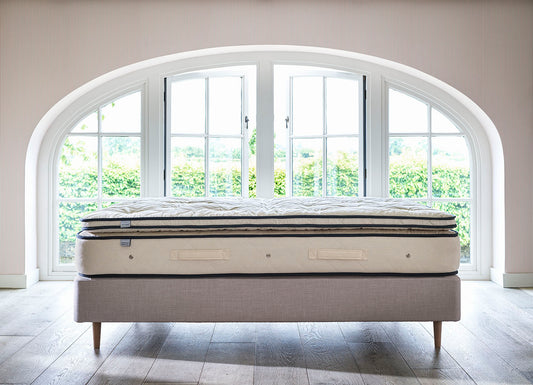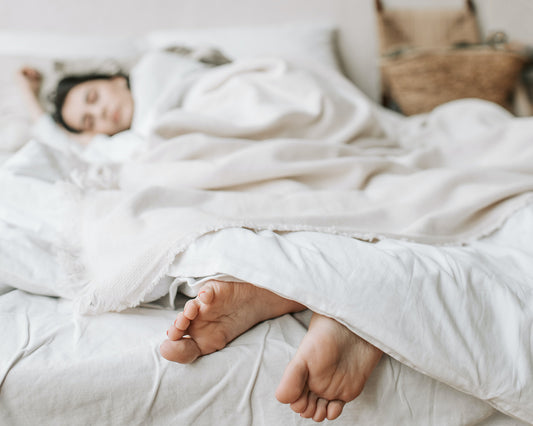Resolutions of eating better, exercising more or catching up with friends more often will have limited success if you’re not supporting them with the best sleep possible. Christabel Majendie, Naturalmat’s sleep expert, explains how you can maximise daytime performance through sleep.
There is a stereotype that leaders don’t indulge in sleep: Winston Churchill, Margaret Thatcher, Elon Musk. In the corporate world, there is a certain bravado for “pulling an all nighter” or working late. But times are changing; the importance of sleep is starting to be recognised, particularly for work performance.
Sleep-related fatigue costs of absenteeism, accidents and lost productivity for US businesses has been estimated at $150 billion a year. The cost of fatigue-related work accidents in the UK is estimated at £115-£240 million per year.
How much sleep we get directly impacts how we perform the next day and employers are beginning to wake up to this news.

How much does lack of sleep alter our performance?
Sustained wakefulness of 17 hours, such as a long day in the office, can lead to impairments to performance equivalent to 0.05% blood alcohol concentration (BOC) and after 24 hours, the equivalent of 0.1%. This is alarming given that if breathalysed in Scotland you are legally drunk at 0.05% BOC and in England at 0.08% BOC. Even more alarming given the number of people who drive under the effects of sleep deprivation.
Several major disasters have been attributed to sleep deprivation including both Chernobyl and the Three Mile Island nuclear accident, and the Exxon-Valdez environmental disaster. It’s estimated that fatigue is implicated in 20% of accidents on major roads.
Sleep and mental performance
Sleep has been compared to the clean-up operation after a house party. During wakefulness (the house party), mess accumulates and damage is done. Sleep then cleans up the mess and repairs the damage, allowing us to wake refreshed for the next house party. These two processes cannot be done effectively at the same time which is why there is a division of labour. So if you are not getting enough sleep, you will not be performing to your optimum level during the day and this detriment can accumulate if you continue to cut back on sleep.

Lab studies highlight this detriment to daytime performance following lack of sleep. Sleep deprivation leads to measurable impairments to attention and memory processes and changes in mood. Following poor sleep, we are more likely to experience irritability, stress, anxiety and low mood, all of which will negatively affect performance. Our ability to sustain attention is impaired, reaction times are slower and accuracy decreases. Studies have also shown poorer recall and recognition of words after sleep deprivation highlighting its impact on memory.
Not only that but studies show sleep deprivation increases rigid thinking and risk taking, impairs speech and leads to poor decision-making, with less use of new information in complex tasks requiring innovation. These negative effects have been shown in real-life settings with health care workers, drivers and military personnel.
What is interesting is that sleep deprivation also affects our evaluation of our own performance, although this appears to vary with age. Younger people tend to underestimate the effects of sleep deprivation (they think they perform better than they do) while older adults tend to overestimate the detrimental effects of sleep loss.
Sleep deprivation and physical health

So lack of sleep affects us mentally. But it also affects our physical health. One study found that people who had an average sleep duration of less than seven hours a night were three times more likely to develop a cold. Sleep is involved in maintaining a healthy immune system so without it you are more vulnerable to infections. In the long term, reduced sleep duration has been linked to a number of health problems such as obesity, diabetes, heart disease and certain cancers.
Athletic performance is undoubtedly affected by sleep deprivation, which is no surprise given its impact on attention, accuracy, reaction times and memory. Studies have shown that in basketball, sleep extension led to faster sprints and increased shooting accuracy. But lack of sleep also makes you more prone to injury with injury rates increasing with reduced sleep duration.
Top 3 proven practical tips:
1. Get enough sleep for you
The amount of sleep you need varies from person to person, but the average is 7-9 hours per night. Some people do just need less sleep than the average and some need a bit more. A good way to find your optimum sleep duration is on holiday. After catching up on any sleep loss, your sleep duration will tend to stabilise if you go to bed when you are sleepy (note this is different to tiredness) and wake up naturally in the morning.
2. Keep a regular sleep schedule
Just as sleep duration varies between individuals, people vary on when they need to go to sleep and wake up. This depends on your individual circadian rhythm or body clock. Some people are naturally night owls, some are larks, and others are something in between. In order to maximise sleep’s potential, go to bed and wake up as close to your own circadian rhythm as possible.
People often decide the timing of sleep based on the wrong reasons: that’s when their partner goes to bed, they have work to do, they stay up late watching films, playing games, or socialising. Whilst we all may cut back on sleep from time to time for these reasons, doing this frequently will start to affect you mentally and physically. So work out when you start to feel sleepy in the evening and take that as your bedtime signal.

3. Practice good sleep hygiene
There are lots of things you can do to improve your chances of getting a decent night’s sleep: cut out caffeine eight hours before bedtime, reduce alcohol use, stop smoking, avoid hefty meals before sleep, put screens away an hour before bedtime, exercise more, get out in the natural daylight, relax in the hour before going to bed.
There are also a number of changes you can make to the bedroom to potentially improve your sleep quality: use black out blinds or thick curtains, ensure your bedroom is cool (between 16-20 degrees), reduce noise disturbance with double glazing or a white noise machine, invest in a comfortable mattress that suits your taste, use bedding with natural fibres to regulate body temperature. Have a look at Naturalmat's Natural Fibre Mattress range here.
There is a clear link between sleep and performance, and we know that the effects of sleep deprivation can cause a number of issues, so it is important to be mindful of your sleep health, and remember that pulling an all-nighter in the name of work isn’t the badge of honour that some think it is!








